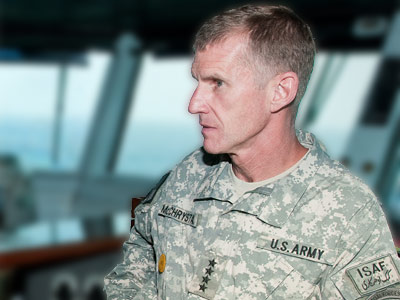The McChrystal Way of War
Mini Teaser: The general was an innovative thinker in the midst of major changes in the Army.
While insiders debate whether counterinsurgency, as practiced by generals such as McChrystal, Petraeus and others, is or should be the prevailing doctrine of twenty-first-century American warfare, realities on the ground in Afghanistans yet to come must be addressed in practical ways that will often differ from historical and traditional doctrines. The world of the late twentieth and early twenty-first centuries requires experimentation, with all the uncertainties and likelihood of failure such experiments imply. A mature perspective will show that Stanley McChrystal was among the few willing to experiment in the service of his nation in an age of transition and transformation. That alone is a demonstration of leadership.
It is something of a comment on our times that McChrystal’s military career ended in controversy. All who followed his story in 2010 are familiar with the circumstances in which a journalist, invited to join a convivial evening with McChrystal, his wife and his senior staff, reported on unguarded remarks, which McChrystal later deemed “unacceptable,” casually critical of the Obama White House. The accuracy of that report remains in doubt. Nevertheless, he flew to Washington and offered his resignation, which the president promptly accepted. The entire incident occupies only a page and a half of his four-hundred-page memoir. But upon publication, this incident dominated the news in the New York Times and elsewhere.
My Share of the Task will take its place among books on leadership for a time—and perhaps for considerable time. But those looking for guidance on leadership might also ask why our society and culture dismiss leaders so casually. There seems to be a disjunction, a mismatch, between the search for leaders and demonstrations of leadership over a lifetime and the often-incidental reasons for dismissing them when they are presented. McChrystal makes no excuses. It is unclear whether he was even aware of the controversial remarks made during what seems to have been a crowded evening. Nevertheless, he accepts responsibility and metaphorically falls on his sword.
A mature nation can surely find a way to reconcile the needs of journalism with the preservation of serious leadership. At present, there seems to be no “give” in the system, no ability to weigh perceived transgressions against the larger scope and scale of command and leadership. McChrystal was right to tender his resignation. The president might have given more thought to rejecting it.
For McChrystal was and is a leader, one with invaluable experience at multiple levels of the changing nature of warfare and the transformation in our military structures and doctrines that those changes are going to require for some time to come. Replacement in his command in Afghanistan need not have required his dismissal from active-duty service in that rare capacity of wise man in a department, and even in a government, not overburdened with wise men and women. To their credit, Yale University and those responsible for his engagement there understand the value his lifetime of leadership experience offers to students who may themselves someday be called upon to demonstrate leadership in a variety of transformational environments.
I, for one, would like to meet him and thank him for his service.
Gary Hart is a former U.S. senator from Colorado.
Pullquote: McChrystal was right to tender his resignation. The president might have given more thought to rejecting it.Image: Essay Types: Book Review
Essay Types: Book Review 